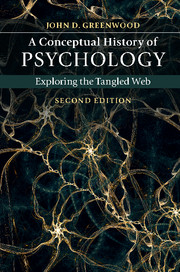Book contents
- Frontmatter
- Contents
- Preface
- 1 History, science, and psychology
- 2 Ancient Greek science and psychology
- 3 Rome and the medieval period
- 4 The scientific revolution
- 5 The Newtonian psychologists
- 6 Physiology and psychology
- 7 Theories of evolution
- 8 Psychology in Germany
- 9 Psychology in America: the early years
- 10 Functionalism, behaviorism, and mental testing
- 11 Neobehaviorism, radical behaviorism, and problems of behaviorism
- 12 The cognitive revolution
- 13 Abnormal and clinical psychology
- Epilogue: the past and future of scientific psychology
- Index
- References
8 - Psychology in Germany
Published online by Cambridge University Press: 05 September 2015
- Frontmatter
- Contents
- Preface
- 1 History, science, and psychology
- 2 Ancient Greek science and psychology
- 3 Rome and the medieval period
- 4 The scientific revolution
- 5 The Newtonian psychologists
- 6 Physiology and psychology
- 7 Theories of evolution
- 8 Psychology in Germany
- 9 Psychology in America: the early years
- 10 Functionalism, behaviorism, and mental testing
- 11 Neobehaviorism, radical behaviorism, and problems of behaviorism
- 12 The cognitive revolution
- 13 Abnormal and clinical psychology
- Epilogue: the past and future of scientific psychology
- Index
- References
Summary
The academic discipline of psychology was founded institutionally in Germany at the end of the nineteenth century. It was a natural outgrowth of the progressive German university system, which was hospitable to the development of new disciplines such as linguistics and psychology. Wilhelm Wundt (1832–1920), who founded scientific psychology in Germany in 1879, the year he set up his experimental laboratory at the University of Leipzig, characterized the new discipline as physiological psychology. This was not because he believed that psychological states and processes must be reductively explained in terms of physiological states and processes, but because he believed that scientific psychology should appropriate the experimental methods that had proved so successful in the development of nineteenth-century German physiology.
Wundt's new experimental program attracted many foreign students, including many Americans, who sought to attain professional qualifications in the new discipline. Having mastered the elements of the new psychology and the structure of the German university system, they returned home to create their own laboratories and PhD programs in psychology.
Wundt's distinctive form of scientific psychology was eventually displaced within Germany as rival programs were created at other German universities. As the twentieth century advanced, German psychology, which faced increasing opposition from the philosophical community, developed into precisely the type of applied discipline that Wundt feared it would become. In a sense, Wundt's fate was like that of the sorcerer's apprentice. In creating a form of scientific psychology based upon laboratory science, he unleashed powerful forces that he was unable to control – forces that, over a few generations, radically transformed the discipline (Danziger, 1990, p. 34).
Psychology in Germany before Wundt
Psychology had been recognized as a distinctive field of inquiry long before the creation of Wundt's laboratory, and academic philosophers in various countries had offered courses in the subject. For example, psychology was offered as a course at Marischal College, Aberdeen, in 1755 under the title Pneumology (Robinson, 1986). Christian Wolff (1679–1754), professor of mathematics at the University of Halle, popularized the use of the term psychology in Europe in the eighteenth century.
- Type
- Chapter
- Information
- A Conceptual History of PsychologyExploring the Tangled Web, pp. 236 - 288Publisher: Cambridge University PressPrint publication year: 2015



